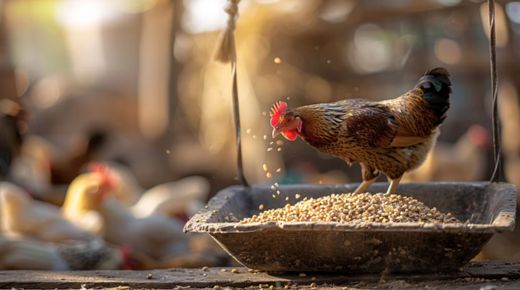
Raising chickens has become a popular endeavor for both hobbyists and small-scale farmers, thanks to the numerous benefits they provide, including fresh eggs, pest control, and natural fertilizer. However, to ensure the health and productivity of these birds, proper nutrition and care are paramount. One critical component of a chicken’s diet is poultry grit. This article explores how poultry grit enhances digestive efficiency, ultimately contributing to healthier, more productive chickens.
Understanding Poultry Grit
Poultry grit consists of small, insoluble particles, often made from crushed granite, that chickens consume to aid in their digestion. Unlike human food, chickens do not have teeth; therefore, they rely on grit to grind and break down their food in the gizzard, a muscular part of their digestive system. This natural process is crucial for maximizing nutrient absorption, leading to better overall health and egg production.
Types of Poultry Grit
There are two primary types of poultry grit: fine grit and coarse grit.
- Fine Grit: This type is typically used for younger birds or those with softer diets. It helps in digesting softer grains and feed, aiding in the proper breakdown of food.
- Coarse Grit: Coarse grit is more suitable for adult chickens, especially those that consume tougher feed like whole grains or tougher forage. It ensures that food is adequately ground before entering the intestines.
The Role of Poultry Grit in Digestion
The digestive system of chickens is designed to efficiently process a variety of feed types. However, without the presence of poultry grit, chickens may struggle to break down their food, leading to reduced nutrient absorption and potential health issues. The gizzard, with its strong muscular walls, relies on the grit to perform its grinding action effectively. When chickens eat grit, it accumulates in the gizzard, where it helps to pulverize food into smaller, more digestible pieces.
Enhancing Nutrient Absorption
By facilitating the breakdown of food, poultry grit plays a vital role in enhancing nutrient absorption. Chickens that have access to sufficient grit are more likely to extract essential nutrients from their feed. This can lead to improved growth rates, better egg production, and overall health. Nutrient deficiencies can result in various health issues, including weak shells in eggs, reduced immunity, and poor growth in chicks.
Impact on Egg Production
For chicken keepers focused on egg production, ensuring hens have adequate poultry grit is essential. Studies have shown that hens with access to grit tend to lay more eggs and produce eggs with stronger shells. The minerals present in poultry grit, particularly calcium, contribute to shell strength and overall egg quality.
Furthermore, hens that are healthy and well-nourished are more likely to exhibit consistent laying patterns, benefiting both the farmer and the consumer.
Preventing Digestive Disorders
Chickens can be susceptible to various digestive disorders, particularly if they are fed diets that are high in carbohydrates or low in fiber. Grit helps mitigate these issues by promoting healthy digestion.
The Risk of Impaction
Without sufficient grit, chickens may develop impaction, a condition where food accumulates in the digestive tract and can cause serious health complications. This issue can lead to discomfort, reduced appetite, and even death if not addressed promptly. Providing poultry grit ensures that chickens can properly digest their food, reducing the likelihood of impaction and other digestive disorders.
Providing Poultry Grit
To ensure that chickens receive adequate poultry grit, it is essential to offer it free-choice. This means placing a container of grit in the coop or run, allowing chickens to consume it as needed. This practice encourages natural foraging behaviors, as chickens instinctively seek out grit to aid in digestion.
When introducing grit to a flock, consider the following tips:
- Monitor Consumption: Observe how much grit your chickens consume. They should be able to self-regulate their intake based on their dietary needs.
- Provide Clean Water: Always ensure that your chickens have access to clean, fresh water, as hydration is vital for digestive health.
- Assess Feed Type: The type of feed your chickens consume will influence the amount of grit they require. A diet high in whole grains may necessitate more coarse grit than a diet consisting primarily of pellets.
Conclusion
Raising healthy chickens requires attention to various factors, including nutrition, housing, and health care. Incorporating poultry grit into a chicken’s diet is a simple yet effective way to enhance digestive efficiency. By promoting better nutrient absorption, preventing digestive disorders, and improving egg production, poultry grit plays a crucial role in the overall health and productivity of chickens. For those looking to raise robust and productive flocks, ensuring access to poultry grit is an essential step in the right direction.














